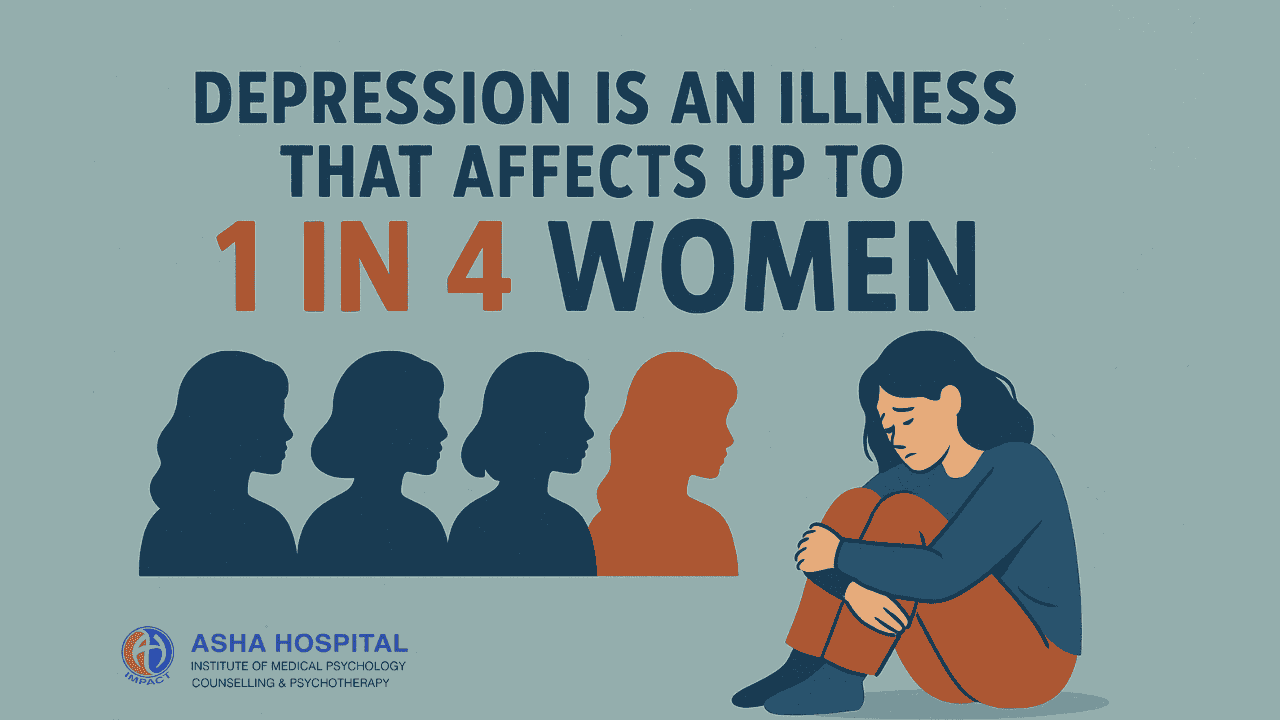Depression is an illness that affects up to 1 in 4 women at some point in their lives.
It often begins when women are in their 20s and 30s, at the same time they may be considering having children. One in 4 women has a risk of developing depressive disorders during pregnancy and after delivery of the child which is called as “perinatal period”
As everyone expects, pregnancy does not provide any protection against depressive disorders in perinatal period.

Risk intensifies in case of past episodes of depression
The woman is at a higher risk if there are past episodes of depressive disorders, substance abuse, family history of mental illnesses, non compliance to the current medications
Untreated perinatal depressive disorders are associated with complications
Untreated and under treated depressive disorders during pregnancy and hampers the woman’s mental well being, associated with higher rates of malnutrition, infrequent antenatal check ups, IUGR (intra uterine growth retardation), infant and mother bonding problems and poor infant’s cognitive development.
What is Major Depressive Disorder (MDD)?
It is a mood disorder. Mood disorders are illnesses that affect a person’s ability to experience normal mood states. They are illnesses occurring due to several factors, majorly biological disturbances involving brain chemicals and receptor sensitivities. Emotional stressors and substance abuse can trigger the occurrence of these changes. Sometimes, there will not be any visible trigger to cause these changes.
Women with MDD may experience two or more from the following;
- *Depressed mood most of the day, nearly every day, for 2 weeks or longer
- *Loss of interest or pleasure in activities that the person usually enjoys.
- *Diurnal variation of mood
- 8terminal insomnia- waking up from sleep in early hours and unable to fall asleep lateron
- Recurrent thoughts of harm to the unborn/ new born baby
- Recurrent thoughts of death or suicide.
- Fatigue or lack of energy
- Anxiety or feeling slowed down
- Feelings of guilt or worthlessness
- Difficulty concentrating
- Trouble sleeping or sleeping too much
- Changes in appetite
- *More characteristic of MDD
Depression during Pregnancy: Special Issues
Contrary to popular belief, pregnancy does not protect a woman from becoming depressed.
About 20% of women experience some depressive symptoms during pregnancy, and about 10% of women develop major depression.
Risk intensifies when
Women who have had major depression in the past have a higher risk of becoming depressed in pregnancy, especially if they stopped taking antidepressant medication while trying to conceive.
A woman whose close family members suffered from mood disorders or depression during their pregnancy and postpartum periods may also be at a higher risk of developing major depression during her pregnancy.
What to do? Whether to use medications or not?
However, in pregnancy concerns arise about using medications to treat depression since they cross the placenta and may be present in the fetal circulation. At the same time, untreated major depression has serious potential risks for mother and fetus, since it may lead to poor nutrition, nicotine and alcohol abuse, suicidal behavior, prolonged or premature labor, and low birth weights and congenital malformations too.
Unfortunately, research information about the safety of antidepressants in pregnancy is limited because there are important ethical concerns about conducting such research.
However, the available research suggests that most of the antidepressants such as SSRI (serotonin reuptake inhibitors) and TCA (tricyclic antidepressants) are safe to use during pregnancy and during lactation.
However it is best to discuss with the Perinatal mental health Specialist regarding the risks and benefits of using medication before starting any medication during pregnancy.
Research on the risk of congenital malformations with antidepressants show unequivocal results, some say there is no increase in risk compared to infants exposed to these medications in-utero, whereas some other studies report slightly higher risk than in the population where these medications have not been given.
In deciding whether a woman should use antidepressant medication while pregnant or trying to become pregnant, a woman and her doctor have to balance the possible risks of the medication against the severity of the depression.
A collaborative care with your treating Psychiatrist, Obstetrician, Radiologist/ sinologist is recommended to identify congenital abnormalities at the earliest and to plan the further course.
Electro convulsive therapy is considered safe and effective for pregnant women especially in their second trimester. This can be considered as an adjunctive treatment for women, whose illness is severe enough causing imminent harm to self and baby, and also in women for whom response with relatively safer antidepressants is not satisfactory.
Depression during postpartum period:
The birth of a baby is generally considered a joyful time, but it is also a time when women are susceptible to depression. Such feelings make it very hard for a new mother to take care of herself and her baby and put strain on the family. Depression that occurs after the birth of a baby is called “postpartum” depression.
What are the types of post partum depression:
There are 2 main kinds of postpartum depression:
- Postpartum or maternity “blues,” a mild mood problem of short duration. Fifty to eighty percent of women in their post partum period may experience maternity blues. It is a self limiting condition, usually resolves in the first month after baby’s birth. One in 5 women with postpartum blues may go on to develop post partum depression.
- Postpartum major depression is a severe and potentially life-threatening illness. It usually starts in the first 2 weeks and may last for a year or longer, if left untreated. The symptoms are similar to Major depressive disorder; predominantly the woman might experience thoughts of harm centric to the newborn baby.
Around 5-10% of women with depressive disorders also have psychotic symptoms like delusion and hallucinations. This condition is called as Postpartum Psychotic depression. They may fear of some harm to the child or herself from a third party is imminent, or claim that the child may not belong to her, thus distancing herself from the child. They may also hear unreal voices with frightening content. You may notice her talking to self or responding to those unreal voices in her mind. Psychotic depression is considered a very severe entity requiring immediate attention and treatment, may be admission into a mental health facility
Women with postpartum depression may also experience distressing thoughts of harm intended to self and the baby.
She may not show interest in handling baby or may have gripping fears to handle the baby herself. On the other hand she may be extremely fearful to turn her attention away from the baby for the fear of harm to the baby if unattended.
About 10%–15% of new mothers develop postpartum major depression, but it is often not diagnosed until several months after the birth. Family members and physicians may also fail to recognize the symptoms as depression, believing instead that the mother’s mood is a normal reaction to the stress of caring for the infant.
What causes postpartum depression?
We don’t know the exact cause of depression, research points out that women who develop postpartum depression are sensitive to the changes of estrogen and progesterone. The brain chemistry of postpartum depression is probably similar to abnormalities that researchers believe are present in other types of depression. This view is supported by the fact that postpartum depression occurs more often in women who have had depressions at other times or have close relatives with depression (where there may be a hereditary factor).
Who is at risk for postpartum major depression?
The most important risk factor for postpartum depression is having had a similar episode before. Over half of the women who have had a previous depression after the birth of a child will become depressed again when they give birth.
If a woman has been depressed at any other time in her life, her risk of developing a postpartum depression also increases, from about 10- 25% .
There is 70-80% of risk of developing postpartum depression if the women has a prior history of Bipolar disorder.
Women are also more vulnerable if they have been depressed during pregnancy, if they had significant premenstrual mood symptoms before they were pregnant, or if they have close relatives with depression or bipolar disorder.
It is very important for a woman with a personal or family history of a mood disorder to talk to her doctor so that she can be monitored closely.
Stressful situations (e.g., health problems in the baby, marital discord, not having a partner) may also place a woman at an increased risk for postpartum major depression.
Untreated postpartum depression can affect the baby overall development.
Studies of depressed mothers have shown that postpartum depression can have significant negative effects on the baby that can persist into childhood. Mothers who are depressed may be less involved with their children. When interactions between mother and infant are impaired, this can have an effect on the child’s later behavior. Studies have shown that such children may not perform as well on some developmental tasks as children of mothers who were not depressed. Their ability to interact with other children may also be affected, and they may have behavioral and learning problems. It is therefore considered very important to identify and treat postpartum depression as early as possible.
How is postpartum depression treated?
Post partum depression is a severe condition and must be treated with medications and counseling. Your doctor may prescribe antidepressants to you, in case postpartum depression symptoms are severe enough. Antipsychotics would be prescribed in case of post partum depression with psychotic symptoms. Sometimes, you may also be advised with Electro convulsive therapy- ECT, depending on the severity of your symptoms and also the response to the treatment.
Can postpartum depressive episodes be prevented?
Previous episodes of depression increase the risk that a woman will develop postpartum depression. The risk is highest in a woman who has actually had postpartum depression after an earlier pregnancy. If a woman has a history of depression, her doctor may discuss treatments to lower the chance it will return after delivery.
Careful monitoring of development of symptoms during the post partum period is warranted. The woman might be benefitted with counseling in case of mild symptoms. However, if a woman has had postpartum depression in the past, most experts recommend beginning preventive treatment with antidepressant medication and psychosocial interventions right after delivery. Your doctor might start the preventive therapy right in your third trimester if she is at very high risk.
Breast feeding and psychiatric medications:
Given the many benefits of breast feeding, some women may wish to continue breast feeding their infants while receiving psychiatric medications. Antidepressants are considered relatively safe during breast feeding and SSRI’s are one of the best studied classes during breast feeding.
Smaller quantities of the prescribed medications do get excreted in the breast milk. With the available information on antidepressants while breast feeding, serious adverse events related to these medications have not been reported. However, there have been reports of milder adverse events such as jitteriness, irritability, excessive crying and sleep disturbances in infants exposed to antidepressants. Depending on the adaptability of the infant, with close observation by the pediatrician, an informed decision can be taken regarding tour medications in breast feeding.
Why Choose Asha Womens Mental Health Clinic for Perinatal Depressive Disorder Care?
At Asha Hospital, we offer expert and compassionate care for women experiencing depression during or after pregnancy. Our specialized team understands the emotional challenges of motherhood and is here to help every step of the way.
- Experienced Specialists: Our psychiatrists and therapists are trained in perinatal mental health care.
- Personalized Treatment: We create treatment plans that suit your needs — including therapy, emotional support, and medication if required.
- Safe and Supportive Space: We provide a non-judgmental, caring environment where mothers feel heard and supported.
- Team-Based Care: Our team includes psychiatrists, psychologists, obstetricians, and pediatricians — all working together for your well-being.
- Focus on Mother and Baby: We ensure both mother and child receive the care they need during this important time.
Asha Hospital is committed to helping mothers feel emotionally strong, healthy, and confident during and after pregnancy.
Asha Womens Mental Health Clinic – Visit HereFAQ – Perinatal Depressive Disorder Care
What is perinatal depressive disorder?
Perinatal depressive disorder includes depression that occurs during pregnancy (antenatal depression) or after childbirth (postpartum depression). It affects a mother’s mood, energy, sleep, appetite, and ability to bond with the baby.
What are the signs of perinatal depression?
Common signs include persistent sadness, low energy, anxiety, sleep issues, difficulty bonding with the baby, irritability, and feeling overwhelmed or hopeless. If these symptoms last more than two weeks, it’s important to seek help.
How is perinatal depression treated at Asha Hospital?
At Asha Hospital, treatment may include counseling, psychotherapy (like CBT), and safe medications if required. Our expert team offers personalized care based on the severity and individual needs of the mother.
Is it safe to take medication for depression during pregnancy or breastfeeding?
Yes, in many cases, medication can be safely used during pregnancy or while breastfeeding under the supervision of experienced psychiatrists. Our doctors carefully assess the benefits and risks before prescribing any treatment.
When should I seek help for perinatal depression?
If you are feeling persistently low, anxious, or overwhelmed during or after pregnancy, it’s important to consult a mental health expert. Early intervention leads to faster recovery and better bonding with your baby.


